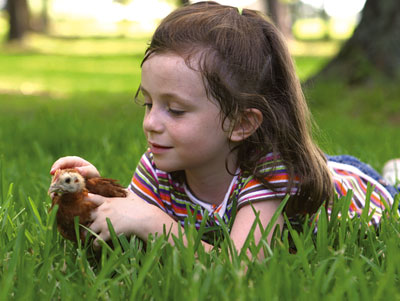Life on the Farm

When Patricia Ballew was a young girl growing up in Orlando, Fla., she could hardly wait for summertime so she could spend a week or so with her grandmother on the family farm in Butler County.The farm was in the rural community of Starlington and offered few luxuries. There was no electricity, no heat or air conditioning and no inside bathroom. But Ballew’s memories are filled more with what the farm gave her, than what it lacked.”My fondest memories as a child were right here on this farm,” said Ballew, who along with her husband Barry lives next door to her father who inherited the farm years later. “We fed the chickens, milked the cow, shelled peas, shucked corn, rode a horse and went fishing. Those were the sort of things most country children did all the time back then, but for me it was a real treat.”Those are the memories that prompted the second-grade schoolteacher to start her summer day camp for kids called “Life on the Farm.””We brought some children to our farm for a field trip, and I found out there are lots of them that have never touched a chicken, seen a real live pig or even gone fishing,” she said. “I wanted them to have some of the same memories that I did. They absolutely love it!”Ballew, who teaches at Fort Dale Academy near Greenville, lives about four and a half miles west of Georgiana. This summer, she hosted four, one-week sessions where students come for two and a-half hours for five days. She picks them up at a central location each morning and returns them to the same spot shortly before lunch. The camp is open to students from K4 to sixth grade and is limited to no more than 10 students at a time.”The children are just exhausted by the time they get through each morning,” she said, “but I am, too. We ride the horse, feed the chickens, pick up eggs, play with the baby chicks, feed the goats, slop the pig – you name it, if it’s done on a farm, we try to do it here.”That includes things like snapping beans and shucking corn — work the children actually enjoy. And learning is taking place all the while, said Ballew.”We also have books about farm animals that we read,” she said. “We learn how chickens lay eggs and how horses are born. It’s a series of life cycle books geared for children this age, and they are fascinated by what they learn.”Barry Ballew, who works as a saw mechanic for Alabama Loggers’ Service Center, builds the pens, sheds and fences needed to house the animals. There’s a miniature horse named Dusty, a pig named Pig Pigg and goats named Bucky and Angel, just to name a few of the animals on the farm.The squeals of children fill the sticky summer air as they run to feed the goats. Then they dart off to the hen house to gather eggs. Finally, they arrive at the chicken coop filled with young chicks.A little apprehensive at first, 8-year-old William Crenshaw isn’t sure what to do when the fledgling chick he’s holding chirps and flaps its wings. “It’s going to bite me,” Will said as he held the bird at arm’s length.”Hold it real gentle and don’t crush his wings,” Ballew tells him. “It won’t hurt you, you have to be gentle with him — he’s just a baby.”Bailey Coker, 7, came prepared for the full, farm-life experience. Wearing a pink floppy hat, a pink short set and a pair of black and pink cowboy boots, she darts from one animal to another. What’s her favorite? It takes her a moment to decide.”I like riding the horse and playing with the chickens,” she said. “But I like the goats, too. I just like it all!”Kaitlin Mosley, 6, said her favorites are the biddies.”They are so soft,” she said as she stroked the head of a young red chicken. She went on to point out the parts of his head, identifying his beak, comb and wattle.”They’re learning all day long, and they aren’t even really aware of it,” Ballew said. “That’s what makes this camp so special. Hopefully, this will also help them appreciate agriculture and help them know what hard work our farmers do to provide us with the food we eat. I want them to know our food doesn’t come from the grocery store and that things haven’t always been as easy as they are now.”Ballew charges a small fee per child, but she said it’s really just to cover the cost of feeding and housing the animals.”My greatest reward is watching them experience things they can’t get anywhere except on a farm, like getting an egg from a nest and understanding what a miracle it is,” Ballew said. “There’s nothing like life on the farm.”
